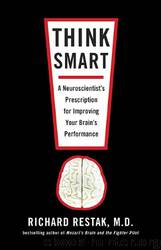Think Smart by Richard Restak M.D

Author:Richard Restak, M.D.
Language: eng
Format: epub
Publisher: Penguin USA, Inc.
Anyone can easily turn up new and intellectually stimulating facts about words with dictionaries and Internet sources. For instance, take a moment and do a quick Internet search by entering “Cerebrate definition.” You’ll learn about cerebralism, how to identify a cerebralist, and anticipate how he might respond to questions about the origin of the human mind. You’ll learn how to recognize cerebricity when you encounter it. You’ll also learn about cerebrates, powerful psychics (also referred to as “zerg cerebrates”) from the StarCraft science fiction series of books and video games. These latter references can provide you with the material to compose your comments and responses to the new word.
After learning the word, mentally construct a sentence using it. As an alternative, try using the word in a sentence at some time during the day. Admittedly, this isn’t always practical. Take my word for today: scrutator. “He answered the scrutator’s questions” doesn’t quite blend as smoothly into most conversations as “He answered the investigator’s questions.” In such instances, instead of using it in a sentence sometime during the day, simply incorporate the word into a written sentence.
Word exercises become even more challenging when you compose a short narrative incorporating as many words as possible from those you’ve learned during a week. This is easiest when the selected words share a common theme. One way of guaranteeing this is to subscribe (at no cost) to www.Wordsmith.org, a website that e-mails a new word each day to subscribers (informally referred to as linguaphiles: lovers of words). The site features a weekly theme that dictates the choice of words for that week. Using that site will make it easier for you to incorporate all or at least most of the words you’ve learned during the week into a short paragraph. Whenever you incorporate the newly learned words into a narrative, you’ll be engaging those parts of the brain concerned with imagination—a vast and interconnected network that defies any attempt to establish firm boundaries.
After several months of collecting and writing new words in your journal, you’ll be able to dip into the list at odd moments and mentally compose sentences and narratives containing as many of the words as you can manage. Finding and learning new words can be done anytime and anywhere a dictionary or computer is available. Best of all, everything that you’ve learned about the word will be entered into longterm memory. Each time you page through your word list, your memory for the listed words will be strengthened.
Download
This site does not store any files on its server. We only index and link to content provided by other sites. Please contact the content providers to delete copyright contents if any and email us, we'll remove relevant links or contents immediately.
Should I Stay or Should I Go? by Ramani Durvasula(7664)
Why We Sleep: Unlocking the Power of Sleep and Dreams by Matthew Walker(6708)
Fear by Osho(4733)
Flow by Mihaly Csikszentmihalyi(4694)
Rising Strong by Brene Brown(4455)
Why We Sleep by Matthew Walker(4436)
The Hacking of the American Mind by Robert H. Lustig(4379)
How to Change Your Mind by Michael Pollan(4355)
Too Much and Not the Mood by Durga Chew-Bose(4344)
Lost Connections by Johann Hari(4174)
He's Just Not That Into You by Greg Behrendt & Liz Tuccillo(3893)
Evolve Your Brain by Joe Dispenza(3676)
The Courage to Be Disliked by Ichiro Kishimi & Fumitake Koga(3497)
Crazy Is My Superpower by A.J. Mendez Brooks(3399)
In Cold Blood by Truman Capote(3380)
Resisting Happiness by Matthew Kelly(3337)
What If This Were Enough? by Heather Havrilesky(3309)
The Book of Human Emotions by Tiffany Watt Smith(3307)
Descartes' Error by Antonio Damasio(3274)
